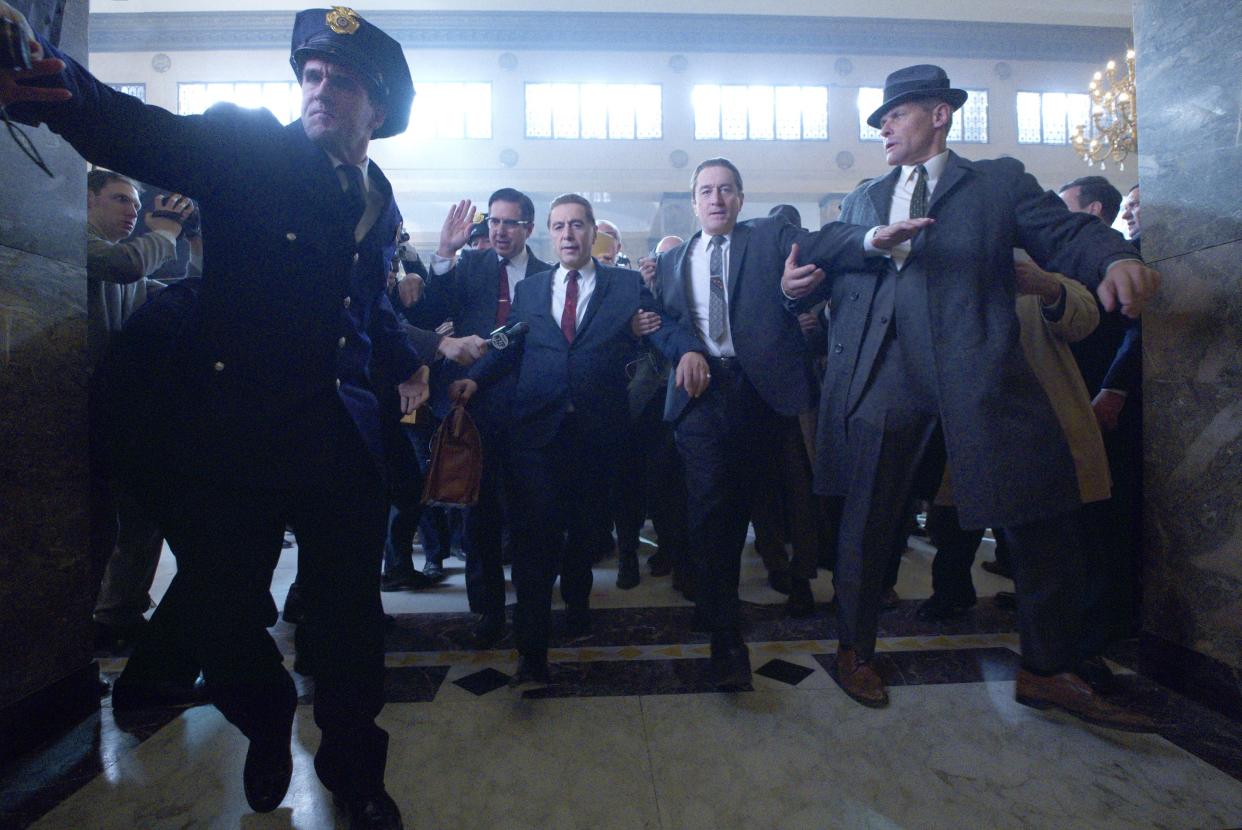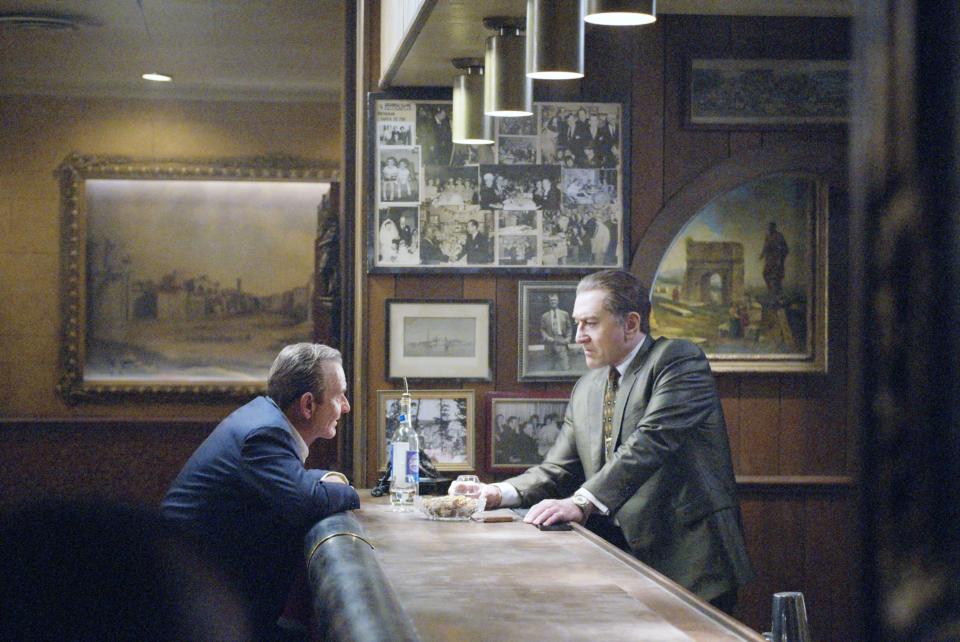Martin Scorsese talks power struggle in 'The Irishman': 'Power erases everything else. Money doesn't matter — it's power.'

Martin Scorsese’s latest crime drama, The Irishman, may take place in America’s not-so-distant past, but the legendary director had the present day very much on his mind at the movie’s New York Film Festival world premiere. Speaking to an enthusiastic crowd of journalists after the nearly four-hour film screened publicly for the very first time, the director framed the film’s account of former mob hitman, Frank Sheeran (Robert De Niro), in language that’s found its way into current news reports that are emanating from Washington D.C.
Before he died in 2003, Sheehan allegedly confessed to his participation in the murder of famed union leader, Jimmy Hoffa (played in the film by Al Pacino) — a story that was recounted in Charles Brandt’s 2004 book, I Heard You Paint Houses, which serves as the basis for The Irishman. De Niro’s version of Frank befriends Hoffa, but is ultimately tasked with carrying out his execution after his mob employers decide that the firebrand is more trouble than he’s worth. “Jimmy has this sense of ‘I’m above the law,’” Scorsese noted, before adding “Nobody’s above the law,” with an emphasis on the word, nobody. “What does it do to us as human beings, or say to us about our society now about being above the law and being reckless… as Jimmy Hoffa became?”
While Scorsese—and De Niro for that matter—refrained from direclty invoking Donald Trump’s name, it was clear that he was drawing a connection between Hoffa’s feelings of invulnerability and notions expressed by the current occupant of the White House. The director went on to deepen the comparison while discussing a larger societal complacency in the face of tragedy and horror that can allow “dark forces” to fester in individual hearts and minds. “It’s about power,” he said, speaking to the way people can incrementally make choices that slowly, but surely alter their sense of morality. “Power erases everything else. Money doesn’t matter — it’s power. And, as you know, they’ll do anything to keep in power.”
The specific power struggle depicted in The Irishman plays out between Hoffa and the Mafia bosses, including Russell Bufalino (Joe Pesci, in his first onscreen role in almost a decade), that the film suggests were behind his ascent to the head of the Teamsters Union in the 1950s. Recruited into the mob by Bufalino, former truck driver Frank is torn between being a good soldier to his father figure and a good friend to Hoffa. In the end, he follows orders, but it costs him in ways that won’t become clear until he’s a much older man. “We wanted to deal with the nature of who we are as human beings,” Scorsese explained, adding that the version of Sheeran that De Niro plays is only a loose approximation of the real man. “[Frank’s] not a psychotic; he’s a human being who has feelings. He finds himself at the most important part of his life in a moral conflict because he’s basically a good man, yet he has to go through with it. How does a good man live with himself after that?”

Those coming to The Irishman anticipating another Goodfellas or Casino — both of which also featured De Niro and Pesci as Mafia men — should temper those expectations. With a 209-minute runtime, this new film moves at a more deliberate pace and largely avoids the rock-and-roll fueled glamour that Scorsese brought to those previous pictures. In fact, The Irishman is closer in spirt to Stanley Kubrick’s 1975 Barry Lyndon, which also languidly charts the course of one man’s life over many decades and the choices he makes that both save and damn him. Scorsese’s approach to the material didn’t immediately attract investors, even with De Niro and Pesci in the mix. “It did take a long time,” De Niro said of “The way Marty wanted to do it, we’re lucky to have people to put up the money.”
Central to Scorsese’s vision was ensuring that De Niro could play Frank throughout the entire film, instead of using a younger actor for flashbacks. That became possible with the advent of the “de-aging” technology seen in Marvel movies, where actors like Michael Douglas and Samuel L. Jackson have had years shaved off their current ages via digital assist. “We couldn’t get the backing for years,” Scorsese remembered. “Then [Lucasfilm's Industrial Light & Magic] had come up with a solution for the de-aging process that wouldn't interfere with Bob and Joe and Al talking to each other with helmets on or tennis balls on their faces. Seriously, I said we're not going to do it. We made tests a few years ago. It's a costly experiment.” Ultimately, Netflix agreed to fund the film for a reportedly $159 million price tag.
While the first trailers for The Irishman raised some concerns about the quality of the de-aged De Niro, the finished product is more convincing, if not always seamless. In certain shots, the “young” Frank’s face has a noticeably plastic look, and De Niro’s body movements can still reflect his current age even as his facial features appear more youthful. Scorsese said that as a test scene to show investors and other actors, he had the de-aged De Niro act out a scene from Goodfellas. “I thought I could extend my career another 30 or 40 years,” De Niro remembered saying when he saw the results of that test. Pacino was even more surprised. “After it was over, I said, ‘Wait a minute — isn’t he old or something? How’d he do that?’
The Irishman opens in theaters on Nov. 1 and will stream on Netflix starting Nov. 27.
Read more from Yahoo Entertainment:
Robert De Niro talks de-aging VFX while debuting new trailer for 'The Irishman'
Fall 2019 movie preview: The 40 films we're most excited to see
See a de-aged Robert De Niro in the first trailer for Martin Scorsese's 'The Irishman'
Want daily pop culture news delivered to your inbox? Sign up here for Yahoo Entertainment & Lifestyle’s newsletter.


